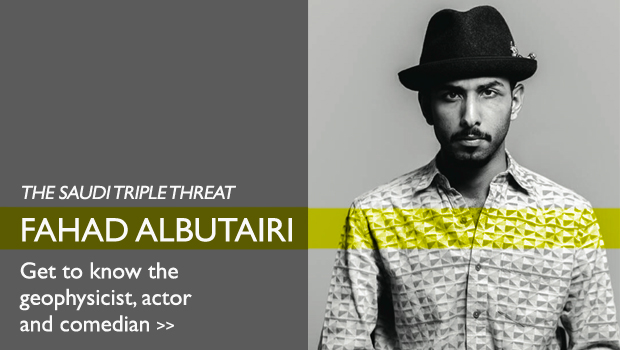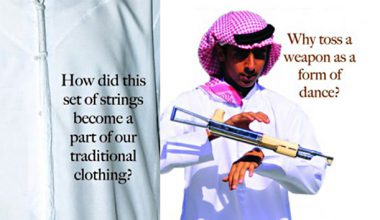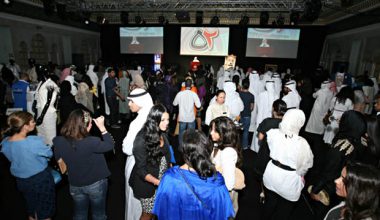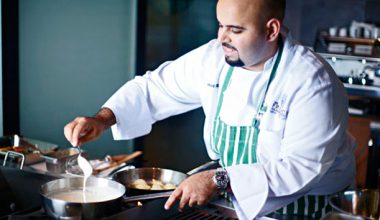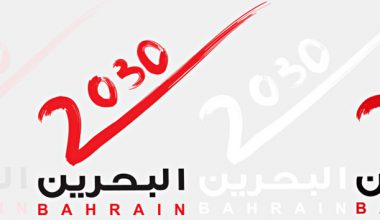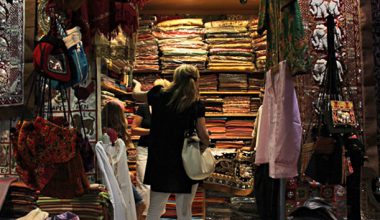 By Ghadeer Al-Otaibi
By Ghadeer Al-Otaibi
If laughter is known as the best form of medicine, then I prescribe to our readers a very necessary dose of Fahad Albutairi. A geophysicist turned comedian turned actor, bred out of Saudi Arabia, with a witty sense of humor, Albutairi is a fresh breath of air for the world of stand-up comedy in the Middle East.
The 26 year old Fahad attempted his first stand-up comedy audition in 2006 during college. He was always interested in drama and theatre, but felt it was too Shakespearean to his liking, allowing him to give stand-up comedy a shot, something he has clearly pulled off. After failing at his first two shows, Fahad started researching and watched about 96 stand up comedy specials, trying to perfect his own sense style.
With help from his director and graphic designer, Fahad started taping his popular Youtube Show, ‘La Yakthar,’ in 2009, a show in which he is propped in front of a white background and most of the comedic dialogue is in Arabic. His work is mainly focused on controversial and political issues, and a dab of his personal experiences around the Gulf, but it is always delivered in an entertaining way. His famous phrase “Wish-tihis-fi” is always said and has somewhat became an attribute to most of the online videos.
I think it’s only fair that we share our one hour of fun with this charismatic young man, so read along and get to know this self described quirky comedian and trust me, if you haven’t heard of him before this interview, I trust that you will be on YouTube looking for him after this.
How is it that you got into the field of comedy?
I attended the University of Texas in Austin from 2003 to 2007. I attempted my first stand-up comedy audition in 2006 while I was attending college and one of the main reasons why I attempted to do this was because while I was growing up in school I was always involved in theatre. I started with drama, then went on to comedy and liked it. Then this whole passion for comedy grew with me. While I was in college I tried to do theatre but it was way too Shakespearean so I decided after watching a few stand-up comedy routines that it might be something that I’d like to try.
What attracted you to stand up comedy?

The difference between a stand-up comedian and an actor in a play is that the stand-up comedian is the actor, the writer, the director, and the performer; he’s everything. The freedom of stand-up comedy was what I found very interesting.
How did you first start out?
During my research, I went back to the classics, like Richard Prior, to some recent ones like Gabriel Iglesias. I kept trying to succeed in stand-up comedy, and alhamdulillah, I did.
It encouraged me to try again and again and again, and I’d go for open-mic nights in comedy clubs in Austin, Texas and I would perform, and after I graduated, I thought to myself that it was a great experience.
After I got back to Saudi Arabia to start work at an oil company, there was an audition in 2008 for opening acts for a stand-up comedy show in Bahrain, which included two famous comedians, Ahmad Ahmad and Maz Jebrani, which I got. I was then asked to perform in Saudi Arabia in 2009, and that was my first performance in Saudi as a stand-up comedian, and it was in English as well, and from then on, my friend and co-writer, Ibrahim Al-Khairallah, started performing in Arabic and began working on the ‘La Yekthar’ show.
Was it difficult transitioning from English to Arabic?
Not really, it was just the switching of the language, not the ideas or the styles. The subjects we talked about in English were the same subjects we talked about it Arabic.
How did you get into filming your show?
I got a little bored with stand-up comedy so I wanted to try an experiment with writing a performance and visual production, and for that I started looking for directors in my contacts. I found Ali Al-Kalthami. I talked to him and he was pretty excited about the idea and he asked me to send him a few scripts, drafts, and ideas. At that time I was a geologist, so I had two weeks on the field, on a rig in the desert, no contact with anyone whatsoever, and then one week off. So I visited him during my one week off, and the guys already had an idea of what they wanted me to do, and he showed me a few examples of other YouTube shows (American). He wanted to do the same style of Ray William Johnson, of the whole first person approach.
We came up with an identity for the show and a Saudi graphic designer, Munira Al-Tamimi, volunteered to design the logo for us. For us, that was the most important thing because we were thinking of the show as a product, not just a show that we wanted to post on YouTube. We started with just 4 people: 2 writers, 2 directors on our staff. We are See Through Films Production House, with a media license and a full studio, and we have about 7 or 8 members in the company now, and more people who are contracted from the outside.
Do you find it hard being a Saudi comedian, when it comes to support from family as well as society?
Alhamdulillah, I didn’t have to work too hard for my family to support me. They were supportive since day one. My dad wasn’t against me, but at the same time he wasn’t fully supportive until he actually saw a few of his friends watching my show, and then he got really excited and was like “that’s my son”. It was mainly because my father never took it seriously until we started getting viral and picking up the pace and taking it seriously ourselves. At first he thought that it was just a side project of mine, something I was doing for fun because I was bored.
So out of all the means of communication, why did you opt for you YouTube?
It’s a form of outlet for media. As you probably know already, media houses and channels in the Middle East are a big bureaucracy to get up to the top. For us, that was just a huge hassle. That made us realize how easy YouTube was, so the main attraction towards YouTube was for three main reasons:
1. It’s cheap, you can sign up for free
2. It’s easy – you can start a channel in about three minutes
3. And lastly, the freedom of speech.
When it comes to freedom of speech, where do you draw the line between how far you are willing to push the envelope?
The way we usually try to filter out a lot of the stuff we do is through some of our friends that we know who know people, who know people, who know people that are in higher places. That’s one way of doing it. The other way of doing it is innately. We, us as Saudi people, who are raised in Saudi Arabia, already grew up with some kind of a filter with what we think we can say and what we think we cannot. In all honesty, the main goal we have when it comes to approaching a lot of the issues is by looking at it and saying in a few years, let’s say ten years, when people look back at the footage we produced, are they going to look at it positively or negatively?
Regardless of whether we get into trouble or not, If they’re going to look at it as just people complaining and nagging and nothing more, then we don’t want to produce. If it’s actually something that’s considered constructive criticism or entertainment at least, we think it’s a good idea. We do also try to steer away from clichés that a lot of the YouTube shows have. We also don’t want a lot of our messages to be approachable directly, we want it to be kind of like hinted, we use symbolism, we use sketches instead of voicing the issue word for word.
Where do you draw inspiration?
A lot of the stuff that I do is based on experience. So I do a lot of improvisation during the shooting of my show, and the guys pick what they like and want to keep from it, but mainly experiences and surroundings.
Regionally and internationally, who are your favorite comedians?
Regionally, I actually admire a lot of the comedians from playwrights. They were amazing, but I’d have to say Hussein Abdulredha and Tarek Al-Ali.
Internationally, I guess a lot of the stand-up comedians. The classics. Richard Prior, Jerry Seinfeld, and Brian Regan. Recently, Louis C.K., as well as a few female comedians, like Tina Fey.
If you could describe yourself in one word, what would that word be?
Other than funny? Quirky.
When performing up on stage, do you ever get nervous and how do you calm your nerves?
I get nervous every time! It doesn’t matter how many times you get on stage, you still get nervous. I’ve done more than 35 comedy shows, and I still get nervous before every show. I’ve performed from Jordan to Lebanon to Kuwait, a lot of places, different crowds of people, and no matter how big or how small the crowd, you still get nervous.
What I try to do is challenge the nerves into energy for the performance on stage. Also, another technique I like to use, not sure if you want to share this with your readers, but I picture the crowd naked trying to cover themselves, therefore they’re all embarrassed already, so nothing I do or say will be as embarrassing as the situation that they’re in. That’s what I started doing up until I started getting some other mental images. Also a tip for pre-show routines: stay away from Red Bull. STAY AWAY FROM RED BULL! Just don’t do it. You get that energy at the start but then you CRASH!
How different are you in real life to the “you” on stage?
I guess I’m a little less energetic. I just take a part of my personality and exaggerate it on stage. There are just a few more dimensions to which I really am. Like most people don’t know I’m a geophysicist. They assume I flunked high school or something because a lot of people’s perceptions of comedians are that they are not academically successful.
What has been your biggest fail moment on stage?
Actually it happened pretty recently. Not my biggest, but pretty big in my standards. A lot of people didn’t even notice it. I was on stage and my sinus was messed up, the spotlights were too close to me and too hot, that I actually kind of blacked out on stage for like two seconds.
Any future projects that you’d like to share with us at Khaleejesque?
There is a short film in the works. In the next year or so, hopefully, we’re already working on the idea for it, and recruiting screenwriters and people to draft a script, but we also want to compete in local film festivals. There’s going to be a little bit of comedy but also action, we want to do something we have never done before.
For more information on Fahad AlButairi, check out his website
Images taken by Farah Al-Shareif.

